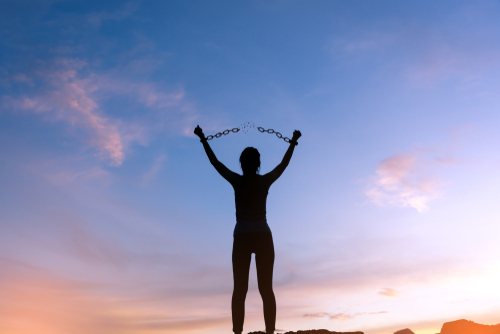What is Being Codependent?
May 01, 2023
Today, we will talk about a topic very close to my heart - codependency. In this blog, we'll explore what it means to be codependent, how it affects our lives, and what we can do to recover from it.
Let's start with the definition of codependency.
According to current research, codependency is an emotional reliance on another person for a sense of self. This means that those who struggle with codependency lack a sense of self. Rather than live life from the place of an autonomous I, codependents tend to become focused on the needs of others.
In simpler terms, codependency is a pattern of behavior where we prioritize the needs of others over our own, to the point where we lose our sense of self. We become so enmeshed in other people's lives that we forget who we are and what we want.
People who are codependent often have a strong need to please others. They feel responsible for other people's happiness and well-being, even if it comes at their own cost. They have difficulty saying no, setting boundaries, and expressing their needs and desires.
Root Causes of Codependency
One of the most common root causes of codependency is childhood emotional neglect, which results in abandonment trauma. Children who are denied a healthy maternal connection cannot secure a healthy attachment to their caretakers. When this happens, the child’s developing brain floods with cortisol, and oxytocin, the bonding chemical that makes it possible for humans to develop trust in others, is suppressed. When a child senses abandonment, they also presume they are at fault for experiencing a lack of connection. This results in the trauma of shame, which can haunt a human being for a lifetime. Needing to please others at the expense of the self is a manifestation of abandonment trauma.

Codependency can manifest in many different ways. It can show up in our romantic relationships, friendships, family dynamics, and even work relationships. It's not just about being in a relationship with someone with an addiction or a mental illness. It's about the way we relate to others and ourselves. We live through others vicariously; we seek approval, are thirsty for approval, and can dive deep into shame spirals when we get the slightest hints that someone we care for is unhappy with us. We can ruminate for days, weeks, months, and even years with worry, regret, and self-doubt.
We are missing our anchor, our divine self, and we are unsure how to reconnect. The saddest thing is we are living out a subconscious pattern, and we don’t even know it. And although that’s not our fault until we awaken and take steps to reprogram our subconscious minds, our inner child stays locked behind the walls we’ve built to shield us from the pain of abandonment we don’t know how to process. In the meantime, we often attract toxic people who exploit our insecurities, abandonment trauma, and codependency issues.
Signs and Symptoms of Codependency
One of the most common symptoms of codependency is anxiety. We feel anxious when we're unable to control other people's behavior, when we can’t get others to respond to us the way we’d like them to, or when we're unable to meet their needs. We worry about what other people think of us, and we're afraid of being rejected or abandoned.
Another symptom of codependency is low self-esteem. We don't value ourselves enough, and we look for validation and approval from others. We feel like we're not good enough and constantly trying to prove ourselves to gain a form of connection and confirmation from the outside. This mirrors how our inner child feels and the trauma they experienced, which we must somehow resolve as adults.
Codependency can also make us feel trapped. We feel like we're stuck in a relationship or a situation that we don't want to be in, but we don't know how to get out of it. We feel we're responsible for other people's happiness and don't want to disappoint them.
So, what can we do to recover from codependency?

The first step is to recognize that we have a problem. We need to acknowledge that our behavior is unhealthy and that we need to change. Acknowledging the truth about your behavior, lack of self-worth, toxic relationships, and family-of-origin issues like alcoholism or emotional neglect are difficult but necessary. The truth Dear One, no matter how painful, will free you.
The second step is to set boundaries. We need to learn how to say no, express our needs and desires, and prioritize our well-being. This happens when you realize how often you say yes without thinking about it. Meditation and journaling are significant assets at this stage because they increase self-awareness and metacognition and help slow down the reactive limbic brain. The goal is to bring your prefrontal lobe back online so the wounds of your frightened inner child are no longer running the ship. The adult in you is waiting to be permitted to care for your inner child. These decisive steps can help you give birth to your authentic tic self.
The third step is to work on our self-esteem. We need to learn how to value ourselves, love ourselves, and believe in ourselves. Start paying attention to things you like to do, create vision boards, and use platforms like Pinterest to peek at your imagination and curiosity. Dare to spend time alone and to play dance music. Maybe clear your morning calendar and take a walk in a nearby park. Or maybe buy some thank you cards and start sending notes of gratitude to those who have inspired you; consider people who always wanted the best for you. Getting in the vibe of gratitude and appreciation is a beautiful antidote when you’re feeling unloved and unlovable. Decide to love and watch what happens next.
[The fourth step is to practice self-care. We must take care of our physical, emotional, and spiritual needs. We need to do things that make us happy and fulfilled. Be mindful of how you spend your time. Should you be watching Netflix before bed, or should you be reading instead? Take accountability for what you eat, how much, and when. Consider your exercise routine; if you don’t have one, start one. If you have financial concerns, invest time watching YouTube videos on how to change your mindset. The key is to start focusing on yourself!
And finally, we need to seek help if we need it. We can't do this alone. We need the support of others who understand what we're going through and can guide us on our journey to recovery. I have found that I resonated most with people who understood my story. I learned to rely on those who knew what I felt before I did; people living below the veil, who had struggles with dysfunctional family trauma issues, who fawned, who struggled with CPTD, and who knew how to recover.
Personally, two of my favorite resources were Melody Beattie and John Bradshaw. I highly recommend their work for anyone looking to recover from codependency, childhood, emotional neglect, and the disease of invisibility.
Dear One, I hope this has been helpful.
Lisa A. Romano is a certified life coach, bestselling author, and top leading expert in the field of mental wellness, codependency, and narcissistic abuse recovery. With over 20 years of experience in the field, Lisa has helped thousands of people heal from childhood trauma, codependency, narcissistic abuse, emotional neglect, and toxic relationships.
Her unique approach to healing focuses on empowering individuals to take control of their lives and break free from the patterns of codependency and narcissistic abuse. Through her books, online courses, and coaching programs, Lisa provides practical tools and strategies that help individuals rebuild their sense of self, set healthy boundaries, and create fulfilling relationships
Lisa's work has been featured in major media outlets such as USA Today, Psychology Today, LA Times, The Huffington Post, and Yahoo Finance. She is also a sought-after speaker and hosts a top leading podcast called Breakdown to Breakthrough.
If you're looking for a compassionate and knowledgeable expert to guide you on your journey towards healing and self-discovery, Lisa A. Romano is the perfect choice. Her expertise, creativity, and compassion, and ability to blend groundbreaking neuroscience, with cutting edge trauma research with spiritual principles make her a standout in the field of mental wellness. Her 12 Week Breakthrough Coaching Program was recently endorsed by Robin Bryman Ph.D.






